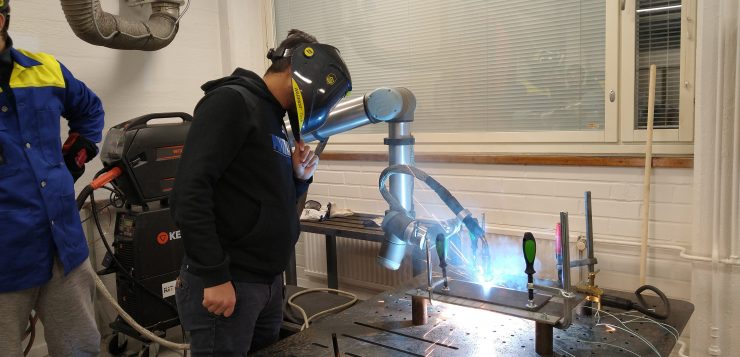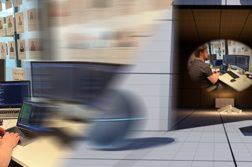Robotics is studied and taught at HAMK’s Riihimäki and Valkeakoski campuses. There have been approximately 25 people working or studying on robotics at the Riihimäki campus this autumn. I met with principal research scientist Francois Christophe and development engineer Milan Gautam. We discussed about robotics and their current projects at robotics research group of HAMK Tech.
What is robotics about?
”Many times, when people talk about robots, they are actually talking about industrial robots which is currently the most common type of robots. However, there are other types of robots too, e.g. collaborative and software robots. We are concentrating on collaborative robotics here at HAMK Tech. We are interested in the co-operation of humans and robots, and safe ways of working with robots”, Christophe says.
Robotics is becoming more and more common in everyday life but there are still many prejudices regarding robotics.
”People may find robots scary or they have a fear on robots taking on their jobs. I’d like to think of robots more as friends than scary. Regarding jobs, humans are still needed to build, teach and collaborate with robots. The work will change but it doesn’t mean that jobs would disappear. At best, robots enhance workers’ quality of work”, Christophe adds.
Providing expertise on testing and studying robotics
The robotics research group is part of HAMK Tech and it conducts research on the use of collaborative robotics in manufacturing industry and extending their use in other sectors like in construction, agriculture, and healthcare. New case organisations are constantly searched.
For instance, the research group provides expertise on testing robots for companies and other organisations which are planning to purchase robots but wish to first see if a robot is applicable for their work or not. These tests can be done within a project and students can get involved in the projects too.
“Our research group provides two kinds of services, testing and researching. Usually, testing is easier and cheaper here than in a company. For example, we could make a digital twin for a robot which is planned to be purchased, and test digitally whether the robot can be used in a company’s settings. Or we could make a research about increasing safeness of the employees by using collaborative robotics”, Christophe and Gautam explain.
At the moment, HAMK Tech is part of three ongoing robotics projects. One of them, Yhteistyörobotit — robotiikan toinen sukupolvi, concentrates on introducing collaborative robots in different fields of application e.g. by providing more information and opportunities for small and medium-sized entreprises in Häme region to test robotics. The two other projects, RoboRiksu and Robo oppii are done in cooperation with HAMK’s research units Smart, Tech and Edu. While RoboRiksu focuses on the development of a common robotics campus between HAMK, Riihimäki’s high school and Hyria — a multidisciplinary educational institution offering vocational education and training — in Riihimäki, Robo oppii’s focus is on enhancing education on robotics from day care to university levels at Riihimäki.
Outreaching robotics
There are two robotics laboratories and HAMK Design Factory’s space for testing and studying robotics at Riihimäki campus. These spaces are being utilized by both students and staff. Furthermore, there have been pupils coming from surrounding schools to learn basics of robotics to the campus.
During our stroll at the campus we meet Fabian from Germany who came to do his bachelor thesis to HAMK this autumn.
“My thesis concentrates on machine vision and using it to sort tomatoes. I didn’t really plan this topic beforehand, it happened to develop here at Riihimäki.”
Christophe started his work at HAMK Tech this year. Gautam has graduated from HAMK and worked for HAMK for a couple of years. Christophe comes from France and Gautam from Nepal. Both have lived in Finland several years. What do they think is unique for HAMK Tech?
”We find different ways to make things happen in a given context. We collaborate with different companies, communities, experts, HAMK’s research units etc. and generate new ideas together. Tech has a good base for partnerships with companies and other universities”, Christophe and Gautam wrap up.
Would you like to know more about robotics research at HAMK? Check out research group’s website in English or in Finnish and contact the crew!
Inka Stormi



